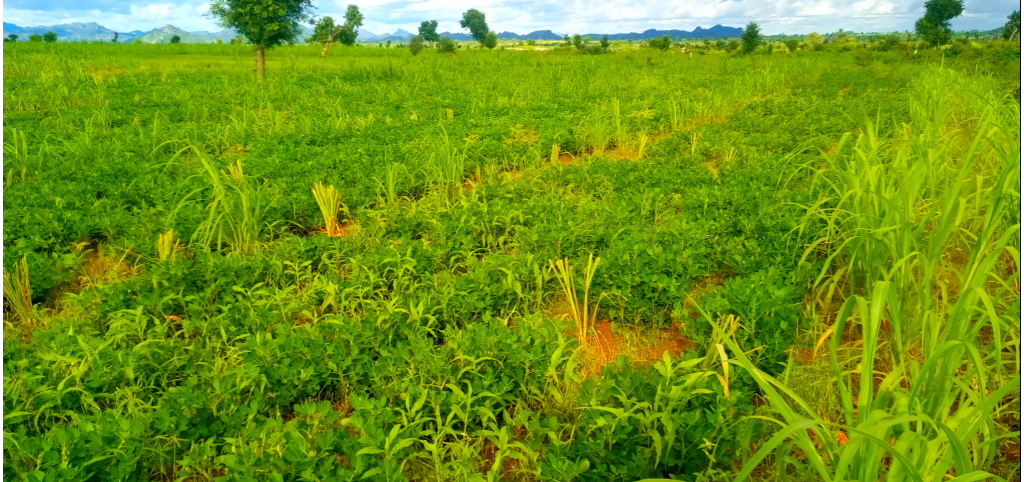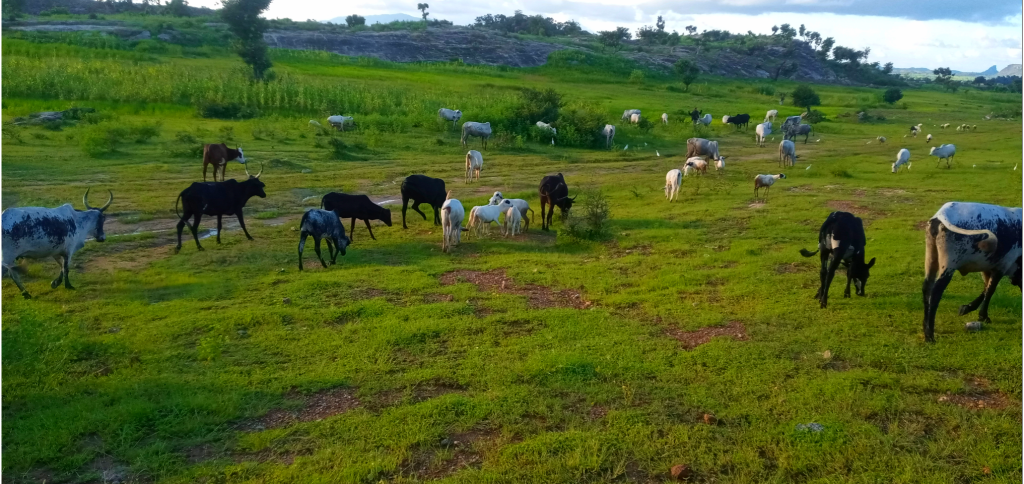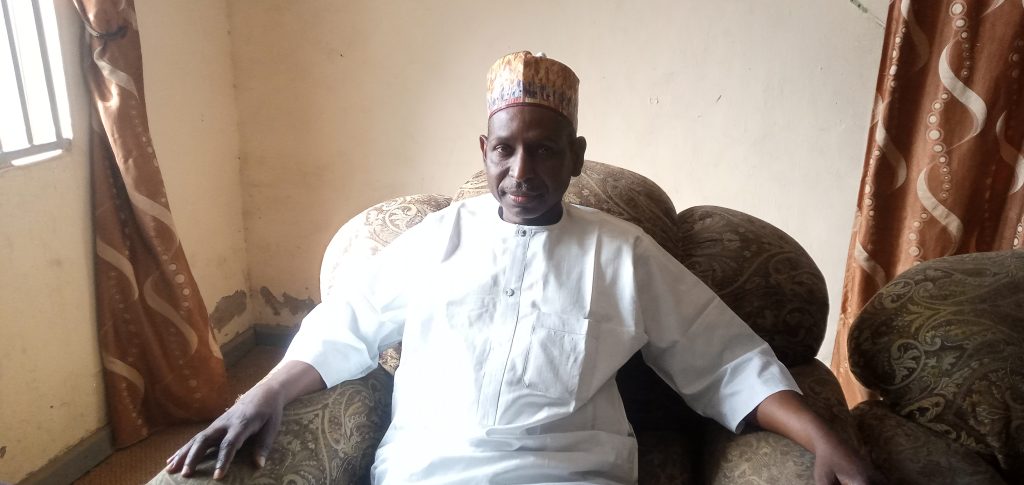Although he is physically challenged, Alhaji Danjuma Abdullahi was excited because the rains are back. On the 15th of June 2022, the rains presented yet another exciting moment for Isah, a resident of Zungur, a community in the southern part of Bauchi.
The disabled sexagenarian ignores all the odds presented by his physical deformities. He is a popular farmer at the Bauchi State Galambi Cattle Ranch. The ranch, owned by the Bauchi State government is leased to farmers for cultivation.
In mid-August, 2022, Danjuma’s maize and rice farms look promising. It was a green flora, and like many farmlands in the area, flowering, “I felt happy whenever I dived into the farm”, he said.
Two weeks later, the 67-year-old Danjuma, hobbled into his maize farm, only to see stalks and straws. He said an 18-hectare farm was shattered by cattle owned by “merciless herders turning the formally flowering crops into shamble. “They grazed in the night destroying farmlands”, he said.
For Danjuma, his farm produce could have sufficed him to feed his family and solve other needs, but his dream crumbled as challenges become stiffer.
The depressed farmer told Xchange Hama that he applied ten bags (500 kg) of fertilizer on the farm just a week before the invasion of the “marauding herders.”
Sadly, despite knowledge about the culprits, he could not trail the herders, “they denied involvement and threatened us”.
The effort of Alhaji Danjuma and other victims to make the herders stop the menace proved abortive. “We sent our delegation to government officials several times, yet, nothing has changed – they kept grazing on the farms”, he said.
In the 18 hectares of farmland, Alhaji Danjuma lost about N2.5 million to the herders’ menace. Stripped of food while his children could no longer continue schooling, as a result of the economic bruises associated with the loss.

The farmer explained that in the last decade, he gave out over 1000 kg of farm produce as alms to the needy in his community. Sadly, he must now buy grains and foodstuffs to feed his 20 family members. Sometimes, they sleep on empty bellies, he said.
About 300 farmlands mostly cultivated by peasant locals in the area were destroyed by the herders’ cows in the 2022 farming season. And Alhaji Danjuma’s ordeal is just one of the several examples of atrocities allegedly perpetrated by the herders in the area.
The affected locals are now feeling the peril of the trashing. Inadequate foodstuff and other domestic problems exacerbated the plight of over a hundred victims.
Ana Yakubu, a resident of Yelwa, a suburb of Bauchi is another victim. She said grazing on her farmland by the herders has exposed her to untold hardship.
The 57-year-old Ana said whenever she sets for the farm, her children normally wished for her a bumper harvest. “Now no single grain with us, we eat only once a day and I don’t know what would happen soon”.
Ana has another pressing pain. “What baffled me much was, they (herders) normally tell us that a cow is better than a human being, and government could not do anything”.
The victim said the herders in several instances raided farmlands in the presence of some farmers, threatening farmers resisting their acts. “But they feel more secure in the night when they graze on people’s farms and walk unchallenged. We reported it to the government officials, but they did not do anything”.
Ana’s savings and the over N250,000 she borrowed from neighbours have dissipated into the thin air.
“Imagine, we are now in November and no grains in the store”, she agonised.

Ana’s frustration was compounded by the government’s failure to pay her two months’ salary. The mother of six said her two sons fell sick and were admitted to a hospital, an omen that further compounded her issues. “And I don’t have any grain to sell or savings for their treatment”, she cried out.
Ana’s four-hectare farmland was full of rice and guinea corn. “Mine was rice and guinea corn. They grazed on them in September just a few days after I applied fertilizer and herbicides”. The aggrieved woman added that she could not visit her farmland afterwards.
Govt Failure to save farmers
Mrs Ana Yakubu stressed that the hundreds of farmers who were affected by the devastation are presently in pathetic condition.
She doubted if the government was willing to protect the defenceless farmers against the herders’ menace. “Can’t the government enforce orders?
For Ana, the Bauchi state government could have supported the tax-paying victims with small mitigative support to alleviate their sufferings.
Alhaji Nura Aminu, one of the farmers delegated to speak with officials of the state government about the herders’ destruction of farmlands agrees with Ana. He said millions of naira worth of crops were lost to the heinous act of the herders as the government looks away.
He argued that, as tax-payers, they followed the required processes and channelled their grievances to the appropriate authorities but their repeated complaints were ignored.
“We went to the Manager of the Galambi Cattle Ranch, we moved to General Yake, (the Special Adviser to Bauchi State Governor on Security Matters), all yielded barren results – destructions continued”.
Nura argued that the loss he incurred was unquantifiable. “No I can’t, the losses cannot be figured out”, he grieved.
He said the harmless farmers got stranded after all efforts failed and now their livelihoods are threatened by destitution and depression.
Nonetheless, Nura wanted the government to come to the aid of especially the less privileged locals and set a policy that would ensure peaceful farming and grazing activities between the two groups.
“We want a sustainable policy that can ensure justice and lasting peace, we don’t mean to grab the land and deny them (herders). Some of the victims exhausted all their savings for farming activities and there are others that borrowed for the purpose of farming, the government should have intervened. But as I am talking to you now, nothing; the victims are stranded”, he added.
Farmland Destructions Threaten Security
For Williams Bukata, a resident of Bayara, after the continued horrors by the herders, they (farmers) in October planned to launch an aggressive face-off with the herders, only for the intervention of the elders.
He alleged that besides the damages, the herders threatened the women that go to the farms. “It is quite painful”, he grieved.
Bukata noted that he lost almost all of his savings to the herders’ atrocities. “Although mine is only one hectare, I lost not less than 200,000. They grazed in the night”.
The peasant farmer said about 500 people were affected. “Some people planted 200 kg of rice, some 400 kg and above, and all rendered waste”.
Ana, Alhaji Danjuma and Bukata, like many other victims, have been farming in Galambi cattle ranch for more than a decade. Supplying food not only to their households but to local markets in the communities. In the 2022 farming season, they have something to say in common, “this season is the worst we experienced”.
Xchange Hama’s visit to the area was revealing and startling. Our correspondent reports that several hectares of rice, maize, cowpea, groundnut, guinea corn, etc were destroyed by the cows.
However, after the damages intensified, the farmers exclusively met and resolved to take the law into their own hands. Reprisal was looming amid anger and frustration.
That was just a week after presenting their resentments to the Bauchi state government, through the Manager of the Galambi Cattle Ranch and the Special Adviser to the Governor on Security matters.
From July to November, 181 farmlands were destroyed. In July, 21 farmlands were destroyed, August 30, September 37, and October 74, and 19 farmlands in November with roughly over 200 hectares.
Besides the local farmers who cultivate to provide their families with at least one meal a day, some injected massive amounts to engage in farming activities as repeatedly urged by governments.
The state government paid them with deaf ears while atrocities intensified as the poor farmers returned home depressed.
With that defacement, their dream dissipated, the government to whom they pay their yearly dues kept mum, and their livelihood plunged into unbearable hardship.
Communities like Liman Katagum, Mararaban L/Katagum, Galambi, Zungur, Luda, and Baram are most affected by the menace.
Farmers and herders in these communities enjoyed peaceful coexistence for over a century, until recently when mistrust, and tension with deadly threats between the two groups who were just partners in the agrarian land surfaced.
Climate Change Crises
A Researcher in Violent Conflicts in Africa, and Human Security Ojemire B. Daniel argued that land and water resources are under increasing stress due to climate change. This, he said is leading to fierce competition and violent conflict over their use between farmers and herders.
He said it also increased the migration of herders from the desert-ravaged zones to the humid areas with greener pastures, and in the process, myriad conflicts emerge.
While farmers see the land as their property right, herders, in contrast, see it as an open space their livestock would feed, thus, encroaching into the land which is allocated to farmers and vice versa.
Herders React
Authorities’ laxity to address the historic farming activity and marginalization of herders on the government-owned property is one of the reasons for the intensified damages, according to Sa’adu Mairiga, one of the herders grazing at Galambi ranch.
The herder told Xchange Hama that the pressure is mounted on the grazing land where the farmers control all the lands and cultivate all their routes, while the government was not doing anything about it.
He said the herders, unlike farmers, are not benefiting from government programs. “Tell me what sustainable government program you know that is meant for herders”, he recalled “Just less than ten years back, there was no farmland here, look at the place now”.
Mairiga, insisted that almost all parts of the routes have been converted into farms and new residential and commercial developments, “this is the genesis of the clashes and the purported destructions”.
Some analysts also argued that ranching, which involves managing livestock in confined farms, leads to better meat and milk production, fewer disease outbreaks, and reduces resource competition between herders and farmers.
But for Mairiga, ranching can only be sustained with serious governments through constant awareness, commitment, and result-oriented policies and sustainable programs.
Alhaji Sadiq Ibrahim Ahmed, the Chairman Miyetti Allah Cattle Breeders Association of Nigeria (MACBAN) Bauchi state chapter said the law that established the Galambi ranch was purposely for grazing purposes. “Galambi ranch should be mostly used by herders from the time the government stopped using it”.
“Following the unsustainable government program in the ranch, the closest beneficiaries should be herders. In contrast, Galambi Cattle Ranch Management handed over the usage of the land to only the farmers, this is obviously injustice against the herders, and it’s the root of the alleged damages”, he stressed.

MACBAN lamented that the fertile lands and the grazing routes in the ranch were all exploited by farmers.
“In fact, if the state government could not address this injustice against the herders, the destructions will inevitably persist”.
He noted that the herders could not be chased out of the ranch, and the herders were ready to hire the land leased to them by the state government.
Alhaji Sadeeq, however, called on the herders to embrace peace as the leadership of BACBAN is doing the needful to provide a lasting solution.
‘We are not happy, but…
Alhaji Nasiru Sani, the Manager of the Galambi Cattle Ranch argued that although the ranch was established for grazing purposes, it was exclusively for government livestock.
Following the state government’s failure to sustain it, the Manager said “the government decided to lease it to only the farmers for income generation”, vowing that the suspected herdsmen are non-indigenes, “they are from neighbouring states”.
Sani said the state government is however trying all efforts to halt the repeat of the 2022 farming season incidents, “people may not need to know all efforts government, but I assure you it wouldn’t repeat again. We would not be happy when farmers invest millions but get home with nothing, we know how it pains”.
Despite meeting persons he described as relevant authorities in the state with respect to the damages done by the herders, the atrocities could not stop.
“I met the Commissioner of Police, Director SS, Secretary to the state government and Security Adviser”.
He however said that the state government has taken a sustainable policy for addressing the trend, and the orchestrated destructions would never resurface in the subsequent seasons. But he said, “the policies made were not made public yet”, he said.
Govt Wouldn’t compensate victims
For decades, the farmers pay for every hectare they used on the ranch. Despite evidence of payments, Alhaji Sani said the government would not compensate the victims. “It’s part of our 16 conditions stipulated, that for any damage done, the government would not be held accountable”.
Sani stressed that any farmer who felt it unbearable, he can leave, “this is all we can do, and we cannot compel any farmer to continue farming there, he can find somewhere else to cultivate”.
We Can’t Lease to Herders
The Manager admitted that the herders requested to use the land, but, “we did not offer it because of the fear of damages. If we rent it to herders, the damages would be high”.
As alleged by a section of some farmers that the management receives bribes from herders to continue grazing, the Manager refuted the claim, “we didn’t receive a token”.
General Markus Yake, the Special Adviser to the Bauchi State Governor on Security Matters declined to grant an interview despite several efforts made by Xchange Hama, and finally meeting him in office.
Phone calls, text messages, and WhatsApp chats sent to Yake clearly stating what was requested from him, all remained unattended as a source told Xchange Hama that he said he would not like to talk with the media.
FOIA was submitted to him, but, the request for some clarifications by the medium on some specific matters was ignored.
This publication is produced with support from the Wole Soyinka Centre for Investigative Journalism (WSCIJ) under the Collaborative Media Engagement for Development Inclusivity and Accountability Project (CMEDIA) funded by the MacArthur Foundation




